|
 Madeja, 2010
Juan Genovés
b. May 31, 1930
_______________________
How Roger Ailes Built the Fox News Fear Factory
The onetime Nixon operative has created the most profitable propaganda machine in history.
Inside America's Unfair and Imbalanced Network
Tim Dickinson
(....)
The key to decoding Fox News isn’t Bill O’Reilly or Sean Hannity. It isn’t even News Corp. chief Rupert Murdoch. To understand what drives Fox News, and what its true purpose is, you must first understand Chairman Ailes. “He is Fox News,” says Jane Hall, a decade-long Fox commentator who defected over Ailes’ embrace of the fear-mongering Glenn Beck. “It’s his vision. It’s a reflection of him.”(....)
To watch even a day of Fox News – the anger, the bombast, the virulent paranoid streak, the unending appeals to white resentment, the reporting that’s held to the same standard of evidence as a late-October attack ad – is to see a refraction of its founder, one of the most skilled and fearsome operatives in the history of the Republican Party....(more)
_______________________
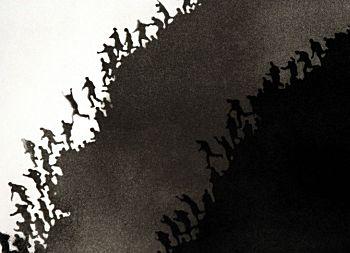
Juan Genovés
_______________________
A Working Boy’s Whitman
George Evans
Jacket 16 - March 2002
(....)
The sane governments, insights, and human affections Whitman intimated were not present where I lived, but he caused me to imagine there was another world, a parallel world, a shadow world of sorts, the way our labor unions were a shadow government. Perhaps in that other world, if I could find it, I would discover the source of his optimism and philosophical certainty, colored with its odd, all-embracing skepticism: “Do I contradict myself? Very well then . . . I contradict myself; I am large . . . I contain multitudes.”
But first I had to understand what he saw when he scanned the wage slave, wife beating, war-scarred motor humpers of the multi-racist working class I was part of, a world where you could be pounded with a bottle if you disagreed with someone, or smashed with a chair if you agreed. What did Whitman see? People with dreams but no money to accomplish them, I concluded, people who mistook work for freedom and poured everything into it, people who lived at the top of their lungs because they were used to being ignored, and people who lived in perpetual motion because they always had somewhere to go for someone else’s sake.
What he praised was not so much our quotidian lives as our loyal industry, unabashed directness, and our impulse to move and change. Change into what? Into anything. In that world only a fool would want to remain the same, though most had no choice but to live out static lives interrupted only by child birth, military service, layoffs, and death. Perhaps, I thought, Walt Whitman was trying to drum up compassion for our world, while trying to lift our spirits and encourage us to break loose — it struck me that way, and there was no one around to argue otherwise. For all I knew, his work represented the sort of political bombast my father was fond of pointing out, but I didn’t want it to be so, and luckily it wasn’t. Like any other adolescent, I cautiously wanted something pure to believe in, and while baseball and basketball won over many of my friends, I went for Whitman....(more)
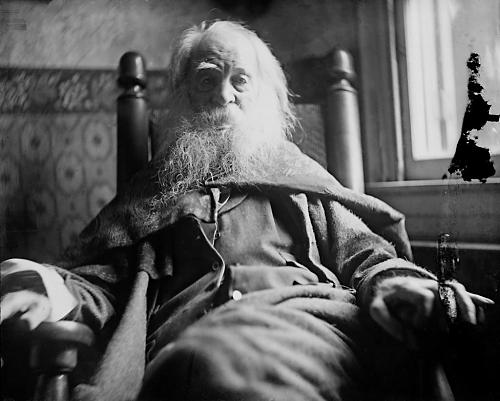
Walt Whitman
b. May 31, 1819
photo - Thomas Eakins, 1891
_______________________
You Furze, Me Gorse
Sarah Hannah
The only true synonyms in the English language are "furze" and "gorse."
— Tennyson
Furze, Gorse, of equal and abiding value
But for the speed of each word off the lips:
The warm and cornucopic cup of U
Hanging on by the very fingertips
Of the lazy Z. Furze, you would lie,
Luxurious; you would make a mattress;
You would carry yellow torches nightly,
Barbed fingers circling in slow caress.
Raise the lamps high, let us look at ourselves:
Once a tender union, now turned fierce,
Twins scratching across sands and rocky shelves.
Furze, Gorse. Which cuts worse?
The claws that grab and cling, purpling the skin,
Or the sudden spike that stabs and runs?
In Memoriam: Sarah Hannah 1966-2007
Eva Salzman
_______________________
from Solar Throat Slashed
4 poems by Aimé Césaire, translated from the French by Clayton Eshleman and A. James Arnold
action yes
Swamp
The swamp unrolling its lasso until then coiled around its navel the swamp spouting odors that until then had woven a shoulder with armpits
The swamp unmaking the evil eye that up to the present had lit up more or less well the wretched den in the depths of which it preserved its faulty reasoning in a jar of luxurious leeches reserved for the blood of the most illustrious crowned heads
and here I am settled via the most obliging quicksand at the bottom of the swamp and smoking the rarest tobacco that any lark ever smoked.
Miasma they told me this could only be the reign of twilight. I hereby notify you that I had been misled. From the other side of life, of death, bubbles are rising. They burst on the surface with the noise of shattered light bulbs. They are the divers of the victims of reclusion resurfacing to put away their heads of lead and of glass their tenderness.
For me every animal is a trumpeter-watchdog.
Every plant a silphium blind word of the North and South.
Stay alert.
They are serpents.
One of them hisses along my spinal column then coiling at the base of my thoracic cage it darts its head up to my spasmodic throat.
At the end the occlusion is sweet and beneath the sand I intone
THE HYMN TO THE LUMBAR SERPENT
...(more)
_______________________
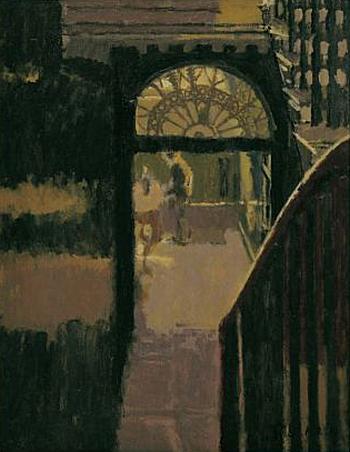
Whistler's studio
c.1915-17
Walter Richard Sickert
b. May 31, 1860
_______________________
Birdwatching Provides an Alternative to Love
(or, The Question Concerning Ornithology)
David Auerbach
adapted from Jonathan Franzen, Liking Is for Cowards. Go for What Hurts.
(....)
...since birds are really just an extension of ourselves, we don’t have to have contempt for its manipulability in the way we might with actual people. It’s all one big endless loop. We like the mirror and the mirror likes us. To watch a bird is merely to include the bird in our private hall of flattering mirrors.
I may be overstating the case, a little bit. Very probably, you’re sick to death of hearing birdwatching disrespected by cranky 51-year-olds. My aim here is mainly to set up a contrast between the narcissistic tendencies of birdwatching and the problem of actual love.
There is no such thing as a person whose real self you like every particle of. But there is such a thing as a person whose real self you love every particle of. And this is why love is such an existential threat to the ornitho-consumerist order: it exposes the lie.
And yet pain hurts but it doesn’t kill. When you consider the alternative — an anesthetized dream of self-sufficiency, abetted by birdwatching — pain emerges as the natural product and natural indicator of being alive in a resistant world. To go through a life painlessly is to have not lived. Even just to say to yourself, “Oh, I’ll get to that love and pain stuff later, maybe in my 30s” is to consign yourself to 10 years of merely taking up space on the planet and watching birds. Of being (and I mean this in the most damning sense of the word) a birdwatcher.
But then a funny thing happened to me. ...(more)
_______________________
Pacific
George Evans
Jacket 36 — 2008
The old poet stumbles on a pebble
along a trail above cliffs at Land’s End
thunder underfoot he says
age reduces everything to sound if you still hear
sight if you can see except for sudden death
life flutters down turn by turn
fast at times but not like cliffs that only blur in fog
and drop without tricks or illusion
row on row the waves/ move landward
silver at the offing a poet’s only silver rumbles
the ear rolling the eye gathers
the horizon in the noise
memory tries to remember any moment
has value they are leaving after all time and the ocean
but only the ocean returns through other eyes
bearing the memory of earth breath of all that lived
this endless commencing after the crash
for George and Mary Oppen
San Francisco, 2008

A crowd listened to the play-by-play
in the 1925 World Series.
(Photo dated Oct. 8, 1925)
The Boston Globe
Archival photos of the Globe's strangely webpage-like Newspaper Row storefront, 1912-1963
via Sheila Lennon
_______________________
Post-Operative Complications Following The Extraction Of Memory
Taha Muhammad Ali
Translation by Peter Cole
In an ancient, gypsy
dictionary of dreams
are explanations of my name
and numerous
interpretations of all I’ll write.
What horror comes across me
when I come across myself
in such a dictionary!
But there I am:
a camel fleeing the slaughterhouses,
galloping toward the East,
pursued by processions
of knives and assessors,
women wielding
mortar and pestle for chop meat!
I do not consider myself a pessimist,
and I certainly don’t
suffer from the shock
of ancient, gypsy nightmares,
and yet, in the middle of the day,
whenever I turn on the radio,
or turn it off,
I breathe in a kind of historical,
theological leprosy.
Feeling the bonds of language
coming apart in my throat and loins,
I cease attending
to my sacred obligations:
barking, and the gnashing of teeth.
I confess!
I’ve been neglecting
my post-operative physiotherapy
following the extraction of memory.
I’ve even forgotten
the simplest way of collapsing
in exhaustion on the tile floor.
_______________________
Extract
The Pleasures and Sorrows of Work
Alain de Botton
By the time we reach the bourgeois thinkers of the eighteenth century, Aristotle's formula has been turned on its head: satisfactions which the Greek philosopher had identified with leisure were now transposed to the sphere of work, while tasks lacking in any financial reward were drained of all significance and relegated to the haphazard attentions of dilettantes. It now seemed as impossible that one could be happy and idle as it had once seemed unlikely that one could work and be human.
Aspects of this evolution in attitudes towards work had intriguing correlatives in ideas about love. In this sphere too, the eighteenth century bourgeoisie yoked together what was pleasurable and what was necessary. They argued that there was no inherent conflict between sexual passion and the practical demands of raising children in a family unit, and that there could hence be romance within a marriage - just as there could be enjoyment in a job.
We are the victims of these two momentous and strangely optimistic ideas. There is immense unthinking cruelty discreetly coiled within the assurance that everyone can discover happiness through work and love. It isn’t that these two entities are invariably incapable of delivering fulfilment, only that they almost never do so. And when an exception is misrepresented as a rule, our individual misfortunes, instead of seeming to us quasi-inevitable aspects of life, will weigh down on us like particular curses. In denying the natural place reserved for longing and incompleteness in the human lot, the modern world denies us the possibility of consolation for our fractious marriages and our unexploited ambitions, and condemns us instead to solitary feelings of shame for having stubbornly failed to make more of our lives.
via Steve Himmer
_______________________
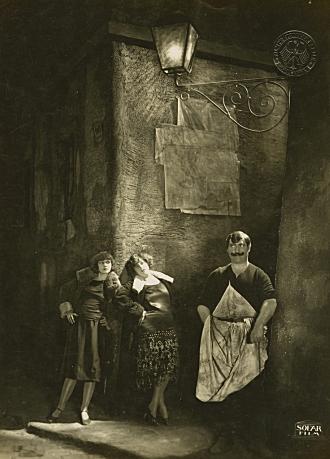
The Joyless Street (1925)
dir.by G.W. Pabst
From Caligari to Hitler
Weimar
watch The Joyless Street here
_______________________
Liking Is for Cowards. Go for What Hurts.
Jonathan Franzen
If you dedicate your existence to being likable, however, and if you adopt whatever cool persona is necessary to make it happen, it suggests that you’ve despaired of being loved for who you really are. And if you succeed in manipulating other people into liking you, it will be hard not to feel, at some level, contempt for those people, because they’ve fallen for your shtick. You may find yourself becoming depressed, or alcoholic, or, if you’re Donald Trump, running for president (and then quitting).
Consumer technology products would never do anything this unattractive, because they aren’t people. They are, however, great allies and enablers of narcissism. Alongside their built-in eagerness to be liked is a built-in eagerness to reflect well on us. Our lives look a lot more interesting when they’re filtered through the sexy Facebook interface. We star in our own movies, we photograph ourselves incessantly, we click the mouse and a machine confirms our sense of mastery.
And, since our technology is really just an extension of ourselves, we don’t have to have contempt for its manipulability in the way we might with actual people. It’s all one big endless loop. We like the mirror and the mirror likes us. To friend a person is merely to include the person in our private hall of flattering mirrors.
I may be overstating the case, a little bit. Very probably, you’re sick to death of hearing social media disrespected by cranky 51-year-olds....(more)
_______________________
Organized Nomadistorms of Broken Oases
Clayton Eshleman with Pierre Joris
action yes
Branching off from the writing of Gilles Deleuze and Felix Guattari in their book Rhizome, Joris has mounted a new poetics on the concept which he lays out in his book, A Nomad Poetics. Here, after quoting Joris’s proposal, I would like to set forth our exchange, illustrate how such theory might relate to Joris’s own recent poetry, and then briefly reflect on the rhizomic, Pound’s Pisan Cantos and Olson’s Maximus Poems.
Joris: What is needed now is a nomadic poetics. Its method will be rhizomic: which is different from collage i.e., a rhizomatics is not an aesthetics of the fragment, which has dominated poetics since the romantics even as transmogrified by modernism, high and low, and more recently retooled in the neoclassical form of the citation—ironic and/or decorative—throughout which is called “postmodernism.” Strawberry Fields Forever. A nomadic poetics will cross languages, not just translate, but write in all or any of them. If Pound, Joyce, Stein, Olson, & others have shown the way, it is essential now to push the matter further, again, not so much as “collage” (though we will keep those gains) but as a material flux of language matter. To try & think, then, of this matter as even pre-language, proto-semantic, as starting from what Julia Kristeva calls the chora, which she defines as “a temporary articulation, essentially mobile, constituted of movements and their ephemeral stases.” And then to follow this flux of ruptures and articulations, of rhythm, moving in & out of semantic & non-semantic spaces, moving around & through the features accreting as poem, a lingo-cubism, no, a lingo-barocco that is no longer an “explosante fixe” (Breton) but an “explosante mouvante.”
Concerning “crossing languages” Joris elsewhere writes: “We will write in foreign languages (real or made-up ones) in order to come to the realization that all languages are foreign. And those that are not are uninteresting in their self-reflecting egoism. All languages are creolized by what Edouard Glissant has called the chaos-world. The first need thus is to have done with the prison-house of the mother tongue i.e., why should one have to write in the mummy/daddy language, why should that oedipal choice be the only possible or legitimate one….” I will return to these points later. Here it is also important to bring in a bit more of the Deleuze and Guattari theory, especially their rejection of the “tree”: “The rhizome is an anti-hierarchical means of organizing knowledge and of recognizing intersections and engagements between seemingly disparate ideas and things. Botanically, the rhizome is a branching that has no ‘center.’ All segments are fertile. Any segment broken off from the rest may serve as a new starting point, a new origin of life. As a heterogeneous composition, it brings all manners of materials into productive contact with one another. In contrast to the tree: knowledge organized around and branching out of a central ‘truck.’ In the arboreal system, ‘trunk’ is understood as origin, source of authenticity or authority. Its branches are mere iterations or representations of their own content.”...(more)
_______________________

photo - mw
_______________________
A Man On Foot
Osip Mandelshtam
translated by Alistair Noon
Mayday
(....)
As if some man walking out of antiquity
who can hear the growth of snow, I’m crossing
a chasm on sagging bridges, it seems,
and the whole of time ticks on stone clocks.
...(more)
via the page
_______________________
Introduction to Charles Bernstein Reading
UCLA, May 16 2011
Brian Kim Stefans
Free Space Comix
(....)
As for Charles’ importance as a poet and theorist, I can only say that writings of his have had immense importance to me as I was “growing up” to be a poet. For instance, when in high school and college, Ezra Pound was really my guide, my “master” if you will—creator of crystalline poems, writer of daring, timely and certainly confident essays that I could use to chart out Modernism and basically all that came before (I was just some kid in the Jersey suburbs, my mother raised during the Korean War, quasi-working class, certainly no one around me was going to help). Pound’s anti-semitism, the radio broadcasts, or his generally complex conservative / libertarian politics never registered as anything I had to deal with—it was all aesthetics—and when they did I was quite troubled for a time. Pound became this big roadblock historically—you had to have an answer about Pound to make sense of all that came after: his generosity to younger poets, the profound flood of new forms that proliferated in the wake of the Cantos, etc.. Anyway, it was actually an essay of Charles, “Pounding Fascism,” that appeared in Artifice of Absorption that kind of did the trick for me; if anything, the essay permitted me—poets are all about the “grand permissions”—to assimilate Pound’s contradictions (the overdetermination of his political views with what seemed like an indeterminate poetics), his unfortunate crossing over into “history” proper—poets won’t try that anytime soon!—and the fecundity of his artistic ideas.
(....) _______________________

Paleocyclists
Poemas del rķo Wang
_______________________
Juan Gregorio Regino: The Poet Speaks, the Mountain Sings (A Talk & a Poem)
presented by Jerome Rothenberg
The Song Begins
(....)
X
Here the fiesta ends,
the road is closed, the song is over.
Lucidity is lingering in the copal,
kernels of corn close up their pages,
standing guard over the journey’s secrets.
A mystery is disappearing,
new ways emerging, ways to fathom life.
The birds trace paths, the earth is fasting.
The moon confides her troubles to the sun
and dawn shakes loose on the horizon..
Here the fiesta ends,
the song rests in the morning’s arms.
The children who spring forth open the world’s heart,
nature is sending signals.
...(more)
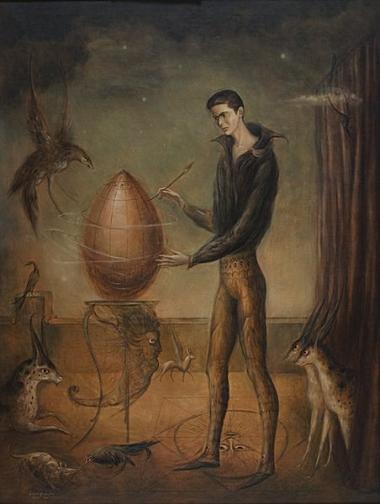
Leonora Carrington
(April 6, 1917 - May 25, 2011)
_______________________
Three steps not beyond:
Peter Handke's trilogy of thresholds
Steve Mitchelmore
this space
(....)
It’s ironic then that Handke has become the focus of disapproval from literary conservatives for whom impatient grasping is the sole gift of writing. They share an intolerance of reading attentively, or even fairly, with his politically conservative critics. The Afternoon of a Writer risks reinforcing prejudices because it is explicitly metafictional; a novel about an unnamed writer living in an unnamed town. The caricature of metafiction as self-regarding, self-obsessional is countered here by an obvious but subtle moment: the use of the third person; not “Ever since the time since I lived” but he. By virtue of writing, the writer is already distant and so is his success. This gives this opening paragraph a peculiar status. If the notation that began the writer’s day is a success only because this distance is recognised and the writer is able to maintain awareness of the apparent disjunct of imagination and life, then the metafictional step is the first toward genuine fiction. The alternative is "straying beyond the frontiers of language" into a realm where the figures of the imagination maintain their power only in a perpetual, award-winning illusion of presence.
...(more)
_______________________
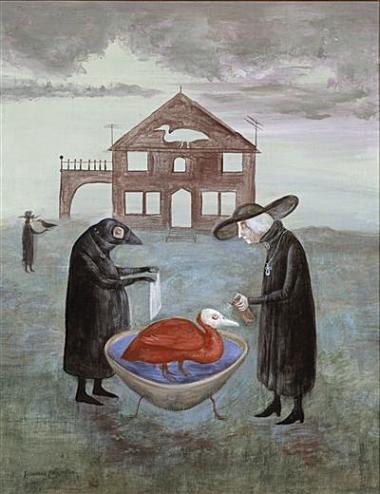
Leonora Carrington
_______________________
Eli Pariser on "The Filter Bubble: What the Internet Is Hiding from You”
democracy now
Well, it’s really striking. I mean, even if you’re not—if you’re logged in to Google, then Google obviously has access to all of your email, all of your documents that you’ve uploaded, a lot of information. But even if you’re logged out, an engineer told me that there are 57 signals that Google tracks—"signals" is sort of their word for variables that they look at—everything from your computer’s IP address—that’s basically its address on the internet—what kind of laptop you’re using or computer you’re using, what kind of software you’re using, even things like the font size or how long you’re hovering over a particular link. And they use that to develop a profile of you, a sense of what kind of person is this. And then they use that to tailor the information that they show you.
And this is happening in a whole bunch of places, you know, not just sort of the main Google search, but also on Google News. And the plan for Google News is that once they sort of perfect this personalization algorithm, that they’re going to offer it to other news websites, so that all of that data can be brought to bear for any given news website, that it can tailor itself to you. You know, there are really important things that are going to fall out if those algorithms aren’t really good.
And what this raises is a sort of larger problem with how we tend to think about the internet, which is that we tend to think about the internet as this sort of medium where anybody can connect to anyone, it’s this very democratic medium, it’s a free-for-all, and it’s so much better than that old society with the gatekeepers that were controlling the flows of information. Really, that’s not how it’s panning out. And what we’re seeing is that a couple big companies are really—you know, most of the information is flowing through a couple big companies that are acting as the new gatekeepers. These algorithms do the same thing that the human editors do. They just do it much less visibly and with much less accountability....(more)
_______________________
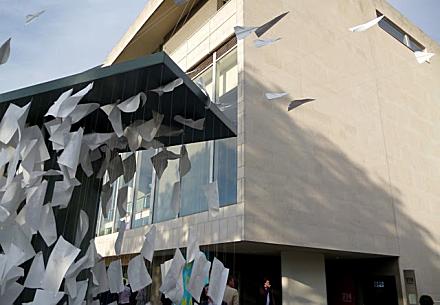 Releasing their words into the world
"The Lion & Unicorn"
installation by
Gitta Gschwendtner
the Southbank Center in London
photos by Jean Morris
tasting rhubarb
_______________________
The Poem as Mask
Muriel Rukeyser
Orpheus
When I wrote of the women in their dances and
wildness, it was a mask,
on their mountain, gold-hunting, singing, in orgy,
it was a mask; when I wrote of the god,
fragmented, exiled from himself, his life, the love gone
down with song,
it was myself, split open, unable to speak, in exile from
myself.
There is no mountain, there is no god, there is memory
of my torn life, myself split open in sleep, the rescued
child
beside me among the doctors, and a word
of rescue from the great eyes.
No more masks! No more mythologies!
Now, for the first time, the god lifts his hand,
the fragments join in me with their own music.
Muriel Rukeyser - the latest addition at PennSound
Out of Silence:
Selected Poems By Muriel Rukeyser
google books
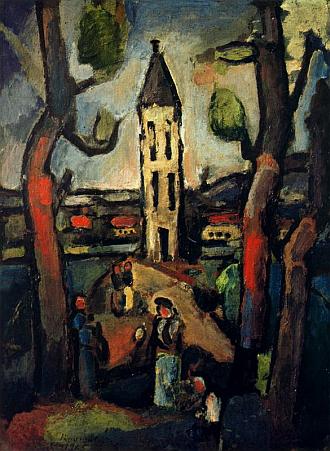
George Rouault
b. May 27, 1871
_______________________
Click
John Barth
b. May 27, 1930
The Atlantic Monthly, December 1997
CLICK?" So (sans question mark) reads the computer monitor when, in time, "Fred" and "Irma" haul themselves out of bed, wash up a bit, slip back into their undies, and -- still nuzzling, patting, chuckling, sighing -- go to check their E-mail on Fred's already booted-up machine. Just that single uppercase imperative verb or sound-noun floating midscreen, where normally the desktop would appear, with its icons of their several files: HERS, HIS, SYSTEM, APPLICATIONS, FINANCES, HOUSE STUFF, INTERNET, and ETC (their catchall file). Surprised Irma, having pressed a key to disperse the screen-saver program and repeated aloud the word that oddly then appeared, calls Fred over to check it out, but the house cybercoach is as puzzled thereby as she. Since the thing's onscreen, however, and framed in a bordered box, they take it to be a command or an invitation -- anyhow an option button, like SAVE or CANCEL, not merely the name of the sound that their computer mouse makes when ... well, when clicked.(...) The Marquise Went Out at Five (La Marquise sortit ą cinq heures) is the title of a 1961 novel by the French writer Claude Mauriac and a refrain in the Chilean novelist José Donoso's 1984 opus Casa de Campo (A House in the Country). The line comes from the French poet and critic Paul Valéry, who remarked in effect that he could never write a novel because of the arbitrariness, the vertiginous contingency, of such a "prosaic" but inescapable opening line as, say, "The Marquise went out at five" -- for the rigorous M. Valéry, a paralyzing toe-dip into what might be called the hypertextuality of everyday life.
(...)
Not too fast there, Mark. Not too slow there, Val. That's got it, guys; that's got it ... (so "CNG" [= I/you/eachandallofus] encourages them from the hyperspatial wings, until agile Valerie lifts one [long] [lithe] [cinnamon-tan] leg up and with her [left] [great] toe gives the Mac's master switch a .......... (more)
_______________________
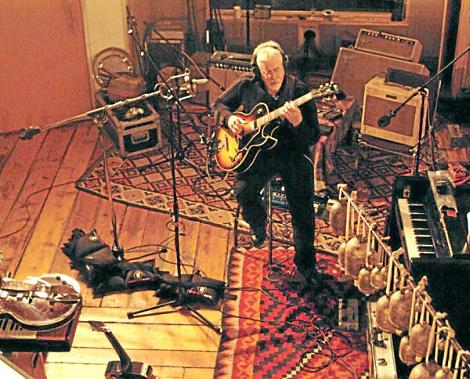
Bruce Cockburn
b. May 27, 1945
The Cockburn Project
Strange Waters
Bruce Cockburn
I've seen a high cairn kissed by holy wind
Seen a mirror pool cut by golden fins
Seen alleys where they hide the truth of cities
The mad whose blessing you must accept without pity
I've stood in airports guarded glass and chrome
Walked rifled roads and landmined loam
Seen a forest in flames right down to the road
Burned in love till I've seen my heart explode
You've been leading me
Beside strange waters
Across the concrete fields of man
Sun ray like a camera pans
Some will run and some will stand
Everything is bullshit but the open hand
You've been leading me
Beside strange waters
Streams of beautiful lights in the night
But where is my pastureland in these dark valleys?
If I loose my grip, will I take flight?
You've been leading me
Beside strange waters
Streams of beautiful lights in the night
But where is my pastureland in these dark valleys?
If I loose my grip, will I take flight?
_______________________

Braque in Utah
Google Maps
_______________________
The View of a Boulevard in Paris
Ralph E. Melcher
Theory Beyond The Codes at ctheory
(....)We are growing more sophisticated in our understanding of the language of images and perhaps less susceptible to their ability to alienate us from our own experience. Our challenge is to understand the language so that we are no longer numbed and overwhelmed by it.
Neither Jose Arguelles or Terence McKenna lived to see whether the confirmation of their theories about time would be confirmed. They presumed to have uncovered the maps that pointed us toward doom or revelation. They tried to break us from the trance where we watch helplessly as society plunges forward and plagues of fear emerge out of the dissonance created in alienation from our own experience. Many who are caught in the tides of the imaginary are brought to despair, confusion and self loathing. Others are victims of impossible inflation turned into ego-lust and greed. We grow terrified of each other.
Opposing this are years of subversion by the prophets of conscious revolution. We grow more sophisticated in our understanding of the language of time itself. Many of us are seeing through the language of the image so that we perceive the real world beneath the projected dream. Many of us, through the shock of change itself are being broken out of the collective trance. Yet, there are no maps that can guide us out of our wonderland. Each of us can only try to distinguish the life around us from the always fading text and images of a dream.
...(more)
_______________________
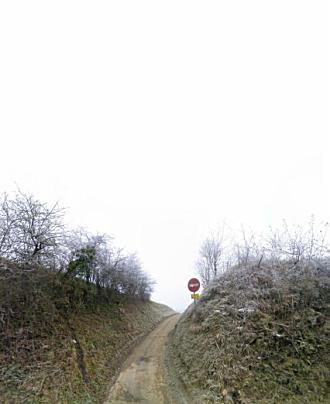
Versificator
Nicholas Mason
produced using Google Street View
via Joerg Colberg
_______________________
Gilles Deleuze: Image and Text
Edited by Eugene W. Holland, Daniel W. Smith and Charles J. Stivale
available at Monoskop/log
Chapter 13
On Finding Oneself Spinozist:
Refuge, Beatitude and the
Any-Space-Whatever
Hélčne Frichot
But if one truly installs oneself in the midst of these propositions, if
one lives them, things are much more complicated and one fi nds that
one is Spinozist before having understood why.
-
Gilles Deleuze, Spinoza: Practical Philosophy
This present investigation, or activity of becoming Spinozist, begins with a fascination in a concept taken up towards the voluntary conclusion of Gilles Deleuze’s life; the concept of a life. And in the midst of this concept we discover a further perplexing term, that of beatitude. Beatitude is the mode of being in which one achieves the maximum of active power or force of existing, and the minimum of reactive passions; the mind becomes a cause of its own ideas, and the body that of its actions in relation to an infi nite milieu. Beatitude, or what the Seventeenth Century Dutch philosopher Benedict de Spinoza also called the third kind of knowledge, is where one’s essence comes to be most fully expressed in a world. Following Deleuze’s Spinozist account, the question of a life, which attains absolute potential and absolute beatitude, installs one in the midst of a plane of immanence, which implies a mode of living or a way of life conducted as an affi rmative and ethico-aesthetic pursuit. We are in the midst of things, as Deleuze and Guattari are fond of telling us, and in being so unsteadily placed we discover ourselves in the context of certain contemporary political and ethical problems through which we must grope in an experimental manner. Deleuze reiterates Spinoza when he stresses that ‘we experience . . . we experiment’, and through such creative experimentation we strive to express the most of our essence of being such that it might offer something up to our present milieu.
(....)
_______________________
Fantasies of the Autobiographical Self: [pdf]
Thomas Bernhard, Raymond Federman, Samuel Beckett
Alfred Hornung
... Bernhard seems to reverse the developmental stages of his novelistic characters in his autobiographical fiction. His point of scriptural departure is the peculiarity of his environment (unstable home, school, grocery store, hospital, sanatorium), which would doom him as it actually dooms his characters to failure and destruction. Yet, in contradistinction to his characters, he decides to counter his condition and conjoins the rare moments of insight, born out of a sensibility heightened by severe illness, into a creative energy. This creative energy becomes the autobiographical impulse which transforms the fragments of experiences into a narrative continuum. The narrowness of space proves to bean open field, a playground for his imagination.
The conception of the text as an imaginary playground becomes increasingly important in Federman’s and Beckett’s autobiographical works, where the reality of the world is seemingly not an issue anymore. Their autobiographical texts are not so much representations of a world past and present, but texts on the problem of writing about the self, “pre-texts” in Federman’s surfictional terminology.
(....) _______________________
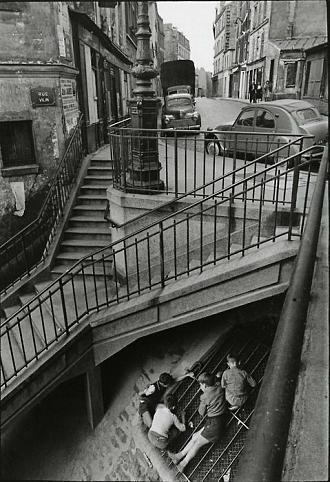
Willy Ronis
plucked from the tumblr stream at (OvO)
_______________________
Three Stories
John Barth
conjunctions
from
And Then One Day
(....)
But even if their situations and temperaments had been otherwise, such that their affectionate casual friendship developed into an amitié amoureuse and thence one day or year into a full-scale May/September love affair (June/October, I suppose, even July/November, given their unhurried pace thus far), with whatever consequences to their lives and careers--so what? Reinvigorated by his new "young" companion (although in fact he hadn't been feeling devigorated as things stood), the aging wordsmith closes out his oeuvre with a sprightly final item or two before ill health or senility caps his pen for keeps; alternatively, he so loses himself in the distractions of a new life at his age that he writes nothing further of more than clinical or biographical interest; or an automobile crash, whether his fault or the other driver's, kills him before either of those scenarios can unfold. Inspired by the first truly mature sexual/emotional relationship of her life, Elizabeth in her forties develops from a quite successful though not extraordinary novelist into one of the memorable voices of her generation; her works are everywhere acclaimed by that minuscule fraction of Earth's human population who take pleasure in the art of written literature, and although death claims her mentor/lover all too soon, she manages to remain vigorously productive even after receipt of her Nobel prize. Or it turns out that their connection doesn't turn out; both parties soon enough recognize (he the more painfully, his misstep being irreversible) that things between them had better remained at the amitié amoureuse stage, better yet at the cordial occasional-lunch stage. Or it does work out, anyhow looks to be working out, when alas the MD-80 ferrying them to St. Bart's on holiday is blown out of the Caribbean sky by Islamic-fundamentalist terrorists; or perhaps Elizabeth, attending to some urban business, is shot dead by an irked carjacker when she resists his heist of her saddle-brown Jaguar.
In each and any case, so what? One more short or not-so-short story of bourgeois romance, domestic tribulation,
personal and vocational fulfillment or frustration, while the world grinds on. Even were it one more narrative of aspiration and struggle in some worthy, impersonal cause, perhaps of fundamental decency versus self-deception, the seductions of language, and the human inclination to see our lives as stories--so what?
The world grinds on; the world grinds on.
So what?
That's a mighty so what, she imagines her friend responding with some concern. Does Miz Liz not remember his distinguishing, back in her advanced-apprentice days, between the readerly reactions So what? and Ah, so!--the former indicating that the author's narrative/dramatic bills remain unpaid, the latter that her dramaturgical bookkeeping is in good order?... (more) _______________________

Dorothea Lange
b. May 26, 1895
_______________________
Wave on wave of life
Like the great wide ocean's roll
Haunting hands of memory
Pluck silver strands of soul
The damage and the dying done
The clarity of light
Gentle bows and glasses raised
To the charity of night
-
Bruce Cockburn, The Charity Of Night
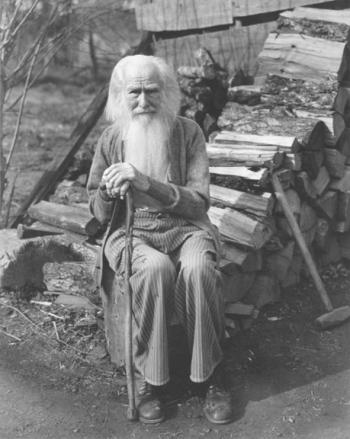
Isaac Burns Cunningham
aged 90
Imogen Cunningham
1936
1 2 3
_______________________
The Far Field
Theodore Roethke
(....)
IV
The lost self changes,
Turning toward the sea,
A sea-shape turning around, --
An old man with his feet before the fire,
In robes of green, in garments of adieu.
A man faced with his own immensity
Wakes all the waves, all their loose wandering fire.
The murmur of the absolute, the why
Of being born falls on his naked ears.
His spirit moves like monumental wind
That gentles on a sunny blue plateau.
He is the end of things, the final man.
All finite things reveal infinitude:
The mountain with its singular bright shade
Like the blue shine on freshly frozen snow,
The after-light upon ice-burdened pines;
Odor of basswood on a mountain-slope,
A scent beloved of bees;
Silence of water above a sunken tree :
The pure serene of memory in one man, --
A ripple widening from a single stone
Winding around the waters of the world.
...(more)
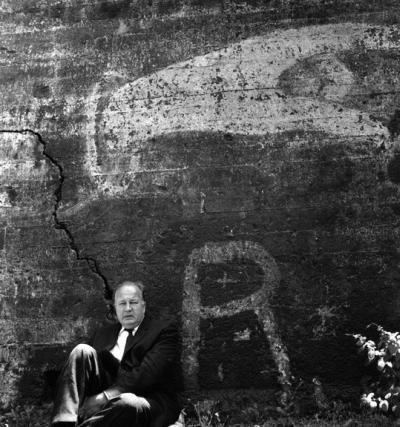
Theodore Roethke
b. May 25, 1908
photo - Imogen Cunningham - 1959
Journey into the Interior
Theodore Roethke
In the long journey out of the self,
There are many detours, washed-out interrupted raw places
Where the shale slides dangerously
And the back wheels hang almost over the edge
At the sudden veering, the moment of turning.
Better to hug close, wary of rubble and falling stones.
The arroyo cracking the road, the wind-bitten buttes, the canyons,
Creeks swollen in midsummer from the flash-flood roaring into the narrow valley.
Reeds beaten flat by wind and rain,
Grey from the long winter, burnt at the base in late summer.
-- Or the path narrowing,
Winding upward toward the stream with its sharp stones,
The upland of alder and birchtrees,
Through the swamp alive with quicksand,
The way blocked at last by a fallen fir-tree,
The thickets darkening,
The ravines ugly.
_______________________

At Point Lobos
Imogen Cunningham
1921
_______________________
Long Live The Weeds
Theodore Roethke
Long live the weeds that overwhelm
My narrow vegetable realm! -
The bitter rock, the barren soil
That force the son of man to toil;
All things unholy, marked by curse,
The ugly of the universe.
The rough, the wicked, and the wild
That keep the spirit undefiled.
With these I match my little wit
And earn the right to stand or sit,
Hope, look, create, or drink and die:
These shape the creature that is I.
_______________________
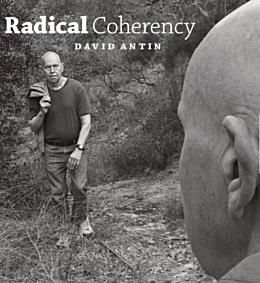
Radical Coherency: Selected Essays on Art and Literature, 1966 to 2005
David Antin
google books
Fractures of the self: a review of "Radical Coherency"
Douglas Messerli on David Antin's new essay collection
jacket2
One of the first things anyone approaching David Antin's marvelous new collection of essays on art and literature will notice is the striking image on the book's cover, a photograph that depicts David Antin, looking perhaps a bit more Buddha-like than in does in real-life, walking toward another image of himself, this from the back side of the face. There is something arresting about this image, even a bit eerie, but I made little of it when I first saw it, except to register that it represented an image of the author, symbolically speaking, of 1966 coming towards his current being. A few friends, however, found that image quite disturbing, one suggesting he had to keep the book face down on his coffee table. Perhaps it was just the oddity of having a photograph, which we associate with the real world, representing something that we know cannot truly happen, one aspect of self meeting up with the other.
Yet, if we read on in Antin's book, particularly in his essay "The Beggar and the King," we recognize that this transaction between two aspects of the self is precisely what the author projects as being behind the narrative genre he has created in the "talk poem." Speaking of his early work, generated by a kind of collage sensibility, Antin observes:
...I started out in the 1950s like many young experimental artists with a strong commitment to most of the received ideas of early twentieth-century modernism, the most important of which for an artist was the idea of the exhaustion, experimental and aesthetic, of representation in all its forms. For a language artist this mostly meant the uselessness of narrative. ...(more)

Early Morning
1825
Samuel Palmer
d. May 24, 1881
_______________________
Doubt
John Latta
Isola di Rifiuti
One of Cozarinsky’s quotes—Barthes, out of Sade, Fourier, Loyola:
(....) The truth is, there is no longer any linguistic space outside bourgeois ideology. Our language comes from it, returns to it, stays locked in it. The only possible riposte is neither challenge nor destruction but, simply, theft—to break up the ancient text of culture, of science, of literature, and disperse its features in unrecognizable patterns, in the same way stolen merchandise is faked. (....)Doubt. The noise of the mowers through the windows. Blue oil-burn cloudlets in raggy squads of dispersal. Scent of fuel and lilac. Catkins rubbish’d by the thunderstorm. Poe’s writer-provoking lines in “The Philosophy of Composition” (1846), claiming (of “The Raven”) “that no one point in its composition is referable either to accident or intuition—that the work proceeded step by step, to its completion, with the precision and rigid consequence of a mathematical problem.” Who believes it? My doubt-druthers go with Marguerite Duras (quoted in Never Any End to Paris wherein doubt “reigns”):
I can say what I like, but I shall never know why people write and how it is people don’t write. In life, there comes a time, and I think it is total, that we cannot escape, where we doubt everything: that doubt is writing.
...(more)
_______________________

photo - mw
_______________________
Part Of Speech
Joseph Brodsky
b. May 24, 1940Translated by Author
...and when "the future" is uttered, swarms of mice
rush out of the Russian language and gnaw a piece
of ripened memory which is twice
as hole-ridden as real cheese.
After all these years it hardly matters who
or what stands in the corner, hidden by heavy drapes,
and your mind resounds not with a seraphic "doh",
only their rustle. Life, that no one dares
to appraise, like that gift horse's mouth,
bares its teeth in a grin at each
encounter. What gets left of a man amounts
to a part. To his spoken part. To a part of speech.
Nobel Lecture Joseph Brodsky
December 8, 1987 Translated from the Russian by Barry Rubin.
(....)Language and, presumably, literature are things that are more ancient and inevitable, more durable than any form of social organization. The revulsion, irony, or indifference often expressed by literature towards the state is essentially a reaction of the permanent - better yet, the infinite - against the temporary, against the finite. To say the least, as long as the state permits itself to interfere with the affairs of literature, literature has the right to interfere with the affairs of the state. A political system, a form of social organization, as any system in general, is by definition a form of the past tense that aspires to impose itself upon the present (and often on the future as well); and a man whose profession is language is the last one who can afford to forget this. The real danger for a writer is not so much the possibility (and often the certainty) of persecution on the part of the state, as it is the possibility of finding oneself mesmerized by the state's features, which, whether monstrous or undergoing changes for the better, are always temporary....(more)
_______________________
Countervailing Powers: On John Kenneth Galbraith
Kim Phillips-Fein
Because of the old faith, inherited from the classical economists and refined to a harsh moral code in the Victorian era, that only hard work, private initiative and a relentless emphasis on increasing productivity could lift human society out of poverty, people were irrationally hostile toward the public sector and government—even though in the modern context they might accomplish goals that were far more socially valuable than the exertions of private firms. Private consumption rose to heights of bizarre extravagance—while schools and parks had to beg for money from the state. “Vacuum cleaners to ensure clean houses are praiseworthy and essential in our standard of living,” Galbraith wrote. “Street cleaners to ensure clean streets are an unfortunate expense. Partly as a result, our houses are generally clean and our streets are generally filthy.” He also observed the odd discrepancy in attitudes toward public and private debt—the one, sharply condemned, the other eagerly encouraged.
The idea that a society ought to commit its economy to satisfying consumer wants no longer made sense if the wants themselves were managed by the companies that were selling the goods to satisfy them (Galbraith called this the “dependence effect”). Once, more production had meant less hunger, less misery, less privation. In the modern world, it only meant satisfying the craving for “shiny rumpus rooms, imaginative barbeque pits, expansive television screens and magnificent automobiles.” Smith had believed that material affluence might lead to a world of greater equality and decency and freedom—but in fact people were enslaved by the whims induced by advertisers. In one of the best-known passages in The Affluent Society, Galbraith described an American family going out for a camping trip in a top-of-the-line “mauve and cerise” automobile, cruising along on a badly paved highway, past a countryside whose natural beauty had been blotted out with billboards, dining on a picnic of packaged foods beside a polluted stream. “Just before dozing off on an air mattress, beneath a nylon tent, amid the stench of decaying refuse, they may reflect vaguely on the curious unevenness of their blessings. Is this, indeed, the American genius?”...(more)
_______________________
Harper's Goal: Create a New Irrational Reality
Murray Dobbin
In observing Stephen Harper for the past 20 years, I have often been reminded of the line from Shakespeare: "The first thing we do, let's kill all the lawyers."
Replace lawyers with scientists, and you capture the role that the irrational plays in the politics of the prime minister.
It shows up everywhere:...(more)
_______________________

Pear Tree in a Walled Garden
Samuel Palmer
c.1829
_______________________
The Art and Practice of the Ordinary
Charles Bernstein
from Attack of the Difficult Poems: Essays and Inventions
The ordinary is always elusive—"near is / and difficult to grasp"—even as it is the most present actuality. And my sense, when talking about the ordinary, is always how extraordinary it is. Paradoxically, any attempt to fix the ordinary pulls it out of the everydayness in which it is situated, from which it seems to derive its power.
The problem with transparent language is that it aims to create a semblance of the ordinary, a spectacle of the ordinary. But that is the opposite of what you may want to achieve. Instead of creating an experience of, or in, the ordinary, you have created a representation of it. Transparency, in trying to picture the ordinary, at the same time removes the reader from it.
In a society of the spectacle, such as American society, much of ordinary life is constructed by consumer culture. In this sense, the mall is the most ordinary environment and shopping the most ordinary activity. Yet, this kind of ordinary may be quite opposite to the everydayness a poet might want to evoke....(more)
_______________________

Samuel Palmer
c. 1826
_______________________
Ratcheting Our Way Up The Evolutionary Ladder
Fred Zackel
(....)Ruminate long enough, and maybe we can determine what it means to be real.
Children and moneys aren't good with reason, persuasion and logic. Being Human, children can grow into those abilities. Monkeys stay behind.
Monkeys do not have the patience to ruminate. (As a corollary, the uncivilized are easily infuriated by civilization. Cultures evolve, too.)
Desperate people make the best stories. "Darling, I missed you," she cried, and fired again.
"I need time to ruminate!" he said, fleeing for his life.
...(more)
_______________________
May 24, 1980
Joseph Brodsky
I have braved, for want of wild beasts, steel cages,
carved my term and nickname on bunks and rafters,
lived by the sea, flashed aces in an oasis,
dined with the-devil-knows-whom, in tails, on truffles
. From the height of a glacier I beheld half a world, the earthly
width. Twice have drowned, thrice let knives rake my nitty-gritty.
Quit the country the bore and nursed me.
Those who forgot me would make a city.
I have waded the steppes that saw yelling Huns in saddles,
worn the clothes nowadays back in fashion in every quarter,
planted rye, tarred the roofs of pigsties and stables,
guzzled everything save dry water.
I've admitted the sentries' third eye into my wet and foul
dreams. Munched the bread of exile; it's stale and warty.
Granted my lungs all sounds except the howl;
switched to a whisper. Now I am forty.
What should I say about my life? That it's long and abhors transparence.
Broken eggs make me grieve; the omelette, though, makes me vomit.
Yet until brown clay has been rammed down my larynx,
only gratitude will be gushing from it.
_______________________

photo - mw
_______________________
A soul on the train
Heli Laaksonen
Translated by Hildi Hawkins and Soila Lehtonen
Poems from Peippo vei (‘The chaffinch took it’, Otava, 2011)
books from finland
First Early
From the potato patch there rose a human seedling, too.
Winston, I called it
as it was Winstons I’d sowed in this row
Whole,
beautiful,
unmarked by hoe or blight.
I put it in the basket with the others.
It sat there in the quiet pile, at the edge,
looked on while I slogged away,
gnawing a little bit out of the side of a potato.
What was it thinking?
What could it be that earlies think about?
The first summer sparrows are fresh out of the oven.
I so wish they’d only think about nice things.
I try to look happy
to give them a good start.
...(more)
Poetry written aloudMervi Kantokorpi on Heli Laaksonen
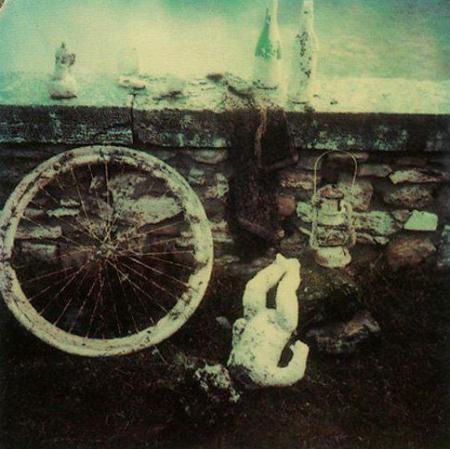
Tarkovsky Polaroids
_______________________
The Glitter Of The Mud
Martin Burke
There are definitions which are useless and less and worse than that and then there are those which are the oars of the boat you row in
Which one man uses to row towards the lost city while at the same time his tribe uses it to row away from the goddess they have denied
Thus I am heir to plenitude and emptiness
The denial is also part of the history of my bones and of the history before that
Not ever fully at ease with such a denial but also never fully embracing its Irish opposite
And now you will say Beckett precedes me there but he precedes everyone into plenitude toward the grandeur of that emptiness only the ancient origins are capable of embracing with any dignity
As if in order to understand the sun I had to enter the dark pupil of its eye
So weep my lost one who has been abandoned when by your Irish weeping I’ll locate you in the dark.
(....)
Borders are only good for breaking through and we were bordered by Frost and too many polite expectations.
And Irish America no grace for my hunger.
The limiting mingling with the sweeter confusions.
A walled-in world there was no way out of until Lorca ceased to be a master and became our brother.
His ‘denude’ a template we cast possible outlines against and judged them worthless or other by that
And the elders judging against us with accusations of betrayal
But as we said to each other with a righteous arrogance: when the temple is empty of grace go pray elsewhere
And we did.
(....) ...(more)
Burke @ Delphic-Ghent
_______________________
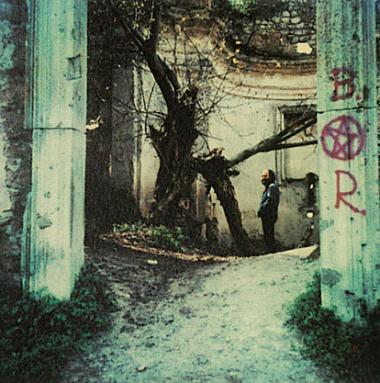
Andrei Tarkovsky
_______________________
Worlds Collide in a Luxury Suite:
Some Thoughts on the IMF, Global Injustice, and a Stranger on a Train
Rebecca Solnit
How can I tell a story we already know too well? Her name was Africa. His was France. He colonized her, exploited her, silenced her, and even decades after it was supposed to have ended, still acted with a high hand in resolving her affairs in places like Cōte d’Ivoire, a name she had been given because of her export products, not her own identity.
Her name was Asia. His was Europe. Her name was silence. His was power. Her name was poverty. His was wealth. Her name was Her, but what was hers? His name was His, and he presumed everything was his, including her, and he thought he could take her without asking and without consequences. It was a very old story, though its outcome had been changing a little in recent decades. And this time around the consequences are shaking a lot of foundations, all of which clearly needed shaking.
Who would ever write a fable as obvious, as heavy-handed as the story we’ve just been given? The extraordinarily powerful head of the International Monetary Fund (IMF), a global organization that has created mass poverty and economic injustice, allegedly assaulted a hotel maid, an immigrant from Africa, in a hotel’s luxury suite in New York City.
Worlds have collided. In an earlier era, her word would have been worthless against his and she might not have filed charges, or the police might not have followed through and yanked Dominique Strauss-Kahn off the plane to Paris at the last moment. But she did, and they did, and now he’s in custody, and the economy of Europe has been dealt a blow, and French politics have been upended, and that nation is reeling and soul-searching....(more)
_______________________

Newsha Tavakolian
via
_______________________
An Invisible Government
Natalia Ginzburg
Translated from the Italian by Lynne Sharon Schwartz
(....)There are people who understand nothing of politics. I am one of them. There aren’t many such people, in fact there may be very few, since almost everyone manages to master a handful of essential notions that permit them to understand the terms and structures of politics. Certain people, however, not only understand nothing of politics but are incapable of thinking politically. They are even less able to express themselves in political terms. I am one of those. The people who do understand politics cannot begin to conceive of what we, the ones who understand nothing, are all about. So I want to explain, since after all, I know.
Thinking and expressing oneself politically means thinking and expressing oneself with a specific purpose in mind. Such a purpose might be aboveboard or corrupt; its ultimate goal might serve justice or oppression. Those who understand nothing of politics, on the other hand, think and express themselves without any goal whatsoever. It may be that their only goal is to explore and express their genuine thoughts. To the politically minded, such a goal seems pointless. And at times it seems utterly pointless to those who understand nothing of politics, too, which makes them despair. However, speaking their minds is the single thing in the world that they know how to do. At other times, they hope that what they say may strike a responsive chord in others. This is nothing like a specific goal, merely a stray hope.
(....)
We are told that in the distant future, maybe after centuries of weapons and prisons, all will be well at last; there will be enough space and liberty for everyone. At last, we’ll no longer need to think in terms of nation-states, of masses of people and of governments, but only of our distinctive and solitary condition as human beings. But no one believes in the future any more. Years ago, we could believe in it; the music of tomorrow, authentic and intoxicating, rang in our ears. Then all at once the future collapsed before our very eyes. So while we long for a better world, we can’t project our longings to centuries from now. We don’t have centuries to wait any more, and even if we did, we have lost the will and the imagination to grasp what shape they might take. Right now we stubbornly love the present; we find ourselves bound by hoops of love to a time that gives no sign of loving us in return.
-
June, 1972
...(more)
via riley dog
_______________________
 plucked from the tumblr stream
12photo
_______________________
Two Mallarmé Poems,
Newly Translated by Peter Manson, with a Note on Translation
presented by Jerome Rothenberg
THE JINX
Above the dumbfounded human herd
the brilliant, savage manes of blue-
starved beggars leapt, their feet already in our way.
A black wind deployed as banner over their march
whipped it with cold so far into the flesh
that it hollowed irritable furrows.
Always in hope of arriving at the sea,
they voyaged without bread, or sticks, or urns,
biting the golden lemon of the bitter ideal.
...(more)
On (Translating) The Poésies Of Stéphane Mallarmé
(....)Though the Poésies were written over a period of thirty-five years, there’s a remarkable density of echoes sounding from poem to poem and back across the decades. Late Mallarmé doesn’t sound much like early Mallarmé, but similar turns of phrase and repeated gestures of piercing, hollowing, digging, drowning, languor, flight, sterility, balancing, burgeoning, fanning, unrolling, contempt, exaltation, fragmenting, hairdressing, mirroring, struggling, frolicking, consecrating, silencing, sailing, enlacing, gestating, extending, stifling, foaming and negation lend the book the almost (but not quite) consistent structure of a flawed crystal. And this structure extends out as far as you care to explore in Mallarmé’s other work (‘Un coup de dés’ sometimes reads to me like a cento constructed from the exploded remains of the Poésies; it also works the other way round).
Mallarmé had a remarkably twentieth-century intuition of language as a system in which significance was a property of the relations among the elements of which it was constructed, rather than a property of the elements themselves....(more)
_______________________
Two challenges to received ideas about communism
Owen Hatherley
Marx and Lenin both liked a joke. So they would have appreciated the irony that, since the ongoing financial crisis began, their analyses of unstable, destructive capitalism has been spectacularly confirmed at the same time that the movement they ostensibly inspired (and for a time, involuntarily gave their names to) lies powerless and moribund. All of capitalism's house journals have run some obligatory article since 2008 asking: "Was Marx right?" but the proletarian revolution has singularly failed to rise in response. There have been very exciting, even epochal outbreaks of revolt, but whether democratic pan-Arabism or internet-assisted student autonomism, they don't threaten capitalism itself. These two short books don't explore this irony, but, in the absence of the movement, they offer challenges to our received ideas about communism....(more)
Owen Hatherley blogs at Sit down man, you're a bloody tragedy
_______________________
Bageant’s Frustration: Extreme Isolation
Morris Berman
There aren’t too many leftnecks in the United States; of that, we can be sure. This was the source of Joe’s frustration: extreme isolation. Because he realized that the U.S. was the greatest snow job of all time. He likened the place to a hologram, in which everyone in the country was trapped inside, with no knowledge that the world (U.S. included) was not what U.S. government propaganda, or just everyday cultural propaganda, said it was. He watched his kinfolk and neighbors vote repeatedly against their own interests, and there was little he could do about it....(more)
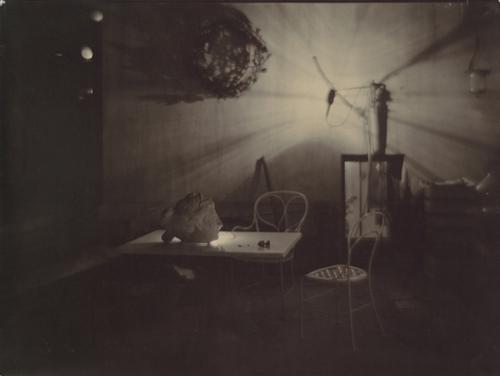
The Arrival of Night
Josef Sudek
1948-64
Night Vision
_______________________
Channeling Georg Trakl
Marjorie Perloff on Christian Hawkey's Ventrakl
Los Angeles Review Of Books
(....)
What saves Ventrakl from being a mere tour de force — an endlessly clever parodic version of specific Trakl source texts — is the book’s increasing sense of bewilderment: as the sequence moves toward its crescendo — an actual translation of Trakl’s great war poem “Grodek,” about the very battle that was to kill him — the reader comes to realize that Hawkey cannot, in the end, identify with Trakl, or even seriously understand him. Too much time has elapsed between the beginning of the twentieth century and that of our own, between the tragic drama of World War and the more farcical than tragic condition of our own “permanent technology-driven warfare” (see Preface). Trakl’s mysterious and opaque lyricism thus becomes the occasion for contemporary speculation on a great Modernist lyric corpus, as appealing as it is out of date in our own self-conscious age. The information overload of Google discourse allows us a startling amount of access, however compromised, to a “foreign” poet; Hawkey can even obtain machine translations, scrambled and distorted as they are, of Trakl’s lyrics. But the more information the author of Ventrakl has about his subject, the less he really knows him. The very words of the poems, so direct and unambiguous in their familiar Deep Image versions, become opaque: the German Abend (evening) yields “ends” and “bends” in English, and the chamber of the heart turns into a wall not to be scaled. ...(more)
.....................................................
Twenty Poems of Georg Trakl [pdf]
Translated by James Wright and Robert Bly
In Venice
Silence in the rented room.
The candlestick flickers with silver light
Before the singing breath
Of the lonely man;
Enchanted rosecloud.
Black swarms of flies
Darken the stony space,
And the head of the man who has no home
Is numb from the agony
Of the golden day.
The motionless sea grows dark.
Star and black voyages
Vanished on the canal.
Child, your sickly smile
Followed me softly in my sleep.
_______________________
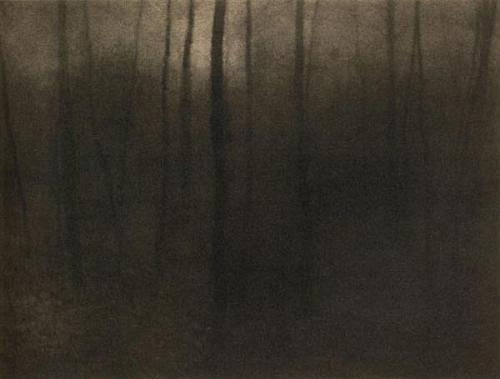
Woods Twilight
Edward J. Steichen
1899
Night Vision: Photography After Dark
The Howard Gilman Gallery
April 26, 2011–September 18, 2011
_______________________
The Importance of Unwritten Postcards
Steve Himmer
the millions
A former student interviewed me recently for an audio journalism project about the dangers of undergraduates being online, a perennial topic for faculty, students, and administrators alike, not to mention for newspapers and cultural hand-wringers at large. Her project arose in response to recent articles about social networking being harmful to student health and emotional well-being, and her questions to me concerned the impact of Facebook and Twitter on classwork and grades. It’s an important conversation, but one that too often stops at the level of panic, so I tried to go in another direction, toward an aspect of digital culture that seems as important as bad grades and lost sleep.
(....)
If I’d been able to share those things quickly, if I’d been able to tweet them or make them my status or even speak them to someone I knew, I might not have hung onto them. If I’d been able to upload my photo of an apparently ancient stone wall on Inishmore that contained, near the bottom and bearing weight, a rock mysteriously stenciled with a bright yellow pedestrian crossing icon, and had someone commented with a quick explanation of why it was there, I might not be thinking about it almost two decades later. Instead it became a defining question for me, a question I’ve been trying to put into words ever since, in poems and stories and my failed first attempt at a novel (and probably the second and third novels, too, in some way). I might not have felt that “extreme isolation” Egan refers to, that uncrossable gulf between “home” and “away,” between “me” and “you” and between “me now” and “me then,” for that matter. I wouldn’t have been forced by circumstance and separation to redefine myself in my own awkward terms rather than rest comfortably uncomfortable in who I’d already been before setting off to “find myself,” as awfully much as that cliché rankles and rots.
...(more)
Steve Himmer is the author of The Bee-Loud Glade
_______________________
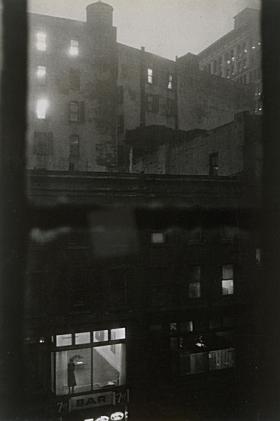
Tenth Street at Night
John Cohen
1960
Night Vision
_______________________
Pathways Magazine - Winter 2011
How Poverty Gets Under the Skin: The Effects of Deprivation On Blood, the Brain, and the Body
The Stanford Center for the Study of Poverty and Inequality
_______________________
Adorno, Benjamin, Bloch, Brecht, Lukįcs: Aesthetics and Politics (1977/1980)
Afterword by Fredric Jameson
First published in 1977
pdf available at Monoskop/log
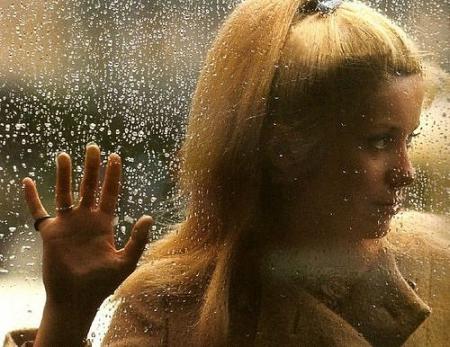
Les Parapluies de Cherbourg
(1964)
Jacques Demy
music by Michel Legrand
youtube
_______________________
Poetry and the State: Series 3 No.15
Modern Poetry in Translation
Singing
Primo Levi
Translation by Marco Sonzogni, Harry Thomas
…But when we began to sing
Our songs, senseless and good,
It seemed that everything
Stood as it once had stood.
The days were merely days.
Seven made a week.
Killing we thought was wicked.
Of dying we didn’t speak.
The months sped by so fast,
With too many to come for complaints!
Again we were only young:
Not martyrs, the shamed, or saints.
We had these thoughts and others
As long as we could sing.
But it’s all hard to explain,
Being a cloudlike thing.
3 January 1946
_______________________
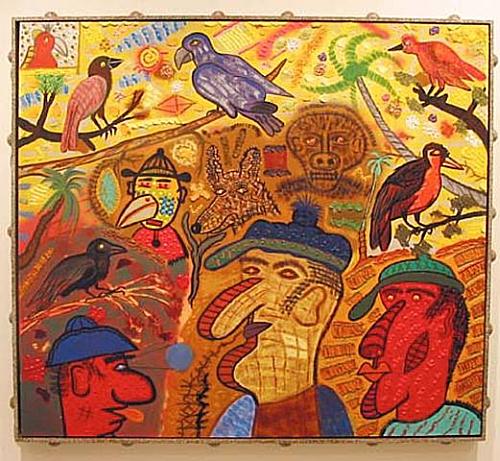
The BirdWatcher
Roy De Forest
d. May 18, 2007
_______________________
Translated Lives:
Autobiography Between Languages And Cultures
Mots Pluriels
No 23. March 2003
Translated lives
Mary Besemeres & Maureen Perkins
If a single book can be said to have launched the new genre of what has been termed 'language memoir', it is Polish-born author Eva Hoffman's Lost in Translation: A Life in a New Language, published in 1989. Hoffman, who emigrated to Canada at thirteen, coined the term 'self-translation' for the experience of being forced to translate between two conceptual and emotional worlds, associated with one's native and learnt languages. The theme of 'self-translation' — across languages, cultures or ethnicities — is central to our issue, and, at one level or another, is present in all of the contributions here. Also in 1989, the runaway success in France was the autobiography of French-Vietnamese writer Kim Lefčvre, Métisse Blanche. In a France preoccupied by discussions about what constituted French identity, and the claims that those born in ex-colonies might have on the nation, this memoir of a child born to a Vietnamese woman and a French soldier, and brought up in a Vietnamese orphanage, captured the reader's imagination. Yet Lefčvre referred to her book as a novel, not as autobiography, and described her Vietnam life as so far away that when her memory turned to it, she at times doubted its reality.
Eva Hoffman's and Kim Lefčvre's memoirs typify the issues presented in this edition of Mots Pluriels. To what extent is all autobiography translation, from that other country that is the past? And what special issues are thrown up for an individual living, thinking, and writing in a language that is not the 'first' language and for an audience that is not of that first language's culture?
_______________________
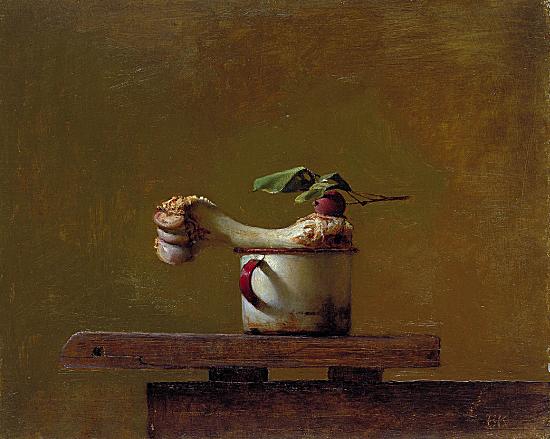
Bone, Cup and Crab Apple
Bruce Kurland
1972
Smithsonian American Art Museum
_______________________
An Interview with Damon Galgut
Kianoosh Hashemzadeh
conjunctions
Memoir, as it happens, is a very popular form in South Africa right now, especially because there’s this sense of unspoken history that’s being reclaimed at the moment. It’s not that I’m resistant to it. We think we know what these categories mean, you know? Memoir or nonfiction is supposed to be “the truth,” whereas fiction, as we understand it, is “untruth.” But, in fact, on closer scrutiny the borders between those different genres are really quite porous and sometimes meaningless. For example, in a book of fiction, and it happens all the time, I might write about a real part of my background or use a real person that I knew. It’s quite commonly accepted to say that such and such an episode, or such and such a character, is based on someone I knew or something I lived through. And that’s not an issue. But if for some reason you go the other way around, it becomes an issue. If you write something that’s very clearly based on your own experience and then call it fiction, people scratch their heads and they’re really bemused.
Let me tell you a little more of my reasoning. I’m sitting here with you, having this discussion, and I’m going to have a memory of this moment, which is made up of a whole tissue of disparate impressions—my temperature, the taste of the coffee, or the expression on your face, along with the words that I’m saying—but when I come to recall this moment later, I will also, if it’s part of a narrative, which is what a journey is—an ongoing narrative—I’m going to select certain elements of the memory and raise them to prominence, and I’m going to drop other elements out of sight completely. I’m going to forget all the irrelevant stuff and give it a core meaning, which is of my own construction. As a writer of fiction I contend that’s what you do whenever you’re constructing your narrative. You decide, at any given moment in your narrative, what’s important and what’s key to that scene, and you bring that into focus, and you let the background be background or, in fact, drop away completely.
So what I’m saying, I guess, is that we’re constructing the story of our lives all the time, and memory, in the end, is no different than the telling of another kind of story. Proof of that, to some extent, if you could interview the people that I made these journeys with, their version of the journeys would bear very little resemblance to mine, except in the most superficial way. So what we think of as being true is really very, very subjective. It’s for that reason that I’m glad the stories are labeled as fiction....(more)
.....................................................
The truth is that he is not a traveller by nature, it is a state that has been forced on him by circumstances. He spends most of his time on the move in acute anxiety, which makes everything heightened and vivid. Life becomes a series of tiny threatening details, he feels no connection with anything around him, he’s constantly afraid of dying. As a result he is hardly ever happy in the place where he is, something in him is already moving forward to the next place, and yet he is also never going towards something, but always away, away. This is a defect in his nature that travel has turned into a condition.
- Damon Galgut
In A Strange Room, by Damon Galgutreviewed by KevinfromCanada
(....)I wander around and come back, then wander again. A large part of travelling consists purely in waiting, with all the attendant ennui and depression. Memories come back of other places he has waited in, departure halls of airports, bus-stations, lonely kerbsides in the heat, and in all of them there is an identical strain of melancholy summed up in a few transitory details. A paper bag blowing in the wind. The mark of a dirty shoe on a tile. The irregular sputter of a fluorescent bulb. From this particular place he will retain the vision of a cracked brick wall growing hotter and hotter in the sun.
Read that excerpt again, because it illustrates one of the very real strengths of this novel. Galgut tells most of it in the third person but every now and then (as in that paragraph) the first person intercedes. Sometimes the first person is there in the present, sometimes he is observing in memory. It is not a jarring technique in any way — the author wants the reader to join him in observing what happens from three points of view — the omniscient narrator, the person in the present and that person looking back on what happened. Part of what is so impressive with this book is the way that Galgut manages those three perspectives so effectively — we see the present from outside, we experience the present as if we are there, we look back on what happened and how it touched us....(more)
In a Strange Room: Three Journeys
Damon Galgut google books
_______________________

Nothing Surprising
Ali Taptik
via
_______________________
Photographs, fieldnotes, and subjectivity
Ryan Anderson
A
Anthropologists, and ethnographers specifically, use photographs all the time. Whether on the covers of ethnographies, or interspersed throughout the pages of texts, photographs are a pretty common element of many anthropological publications. Like the ubiquitous locational maps and statistical figures, images of places or ethnographic participants are pretty standard fare. What tends to be absent, however, are overt discussions of the actual use of photography as an anthropological/ethnographic method. This isn’t the case with all ethnographies, mind you, since there are indeed some that engage with photography in a very direct manner (Righteous Dopefiend is one recent example that comes to mind). But in many ethnographies that I see, photographs seem to just exist, floating in a sea of words. While many ethnographers spend a decent amount of time writing and thinking how and why they employ key methods such as participant observation, interviews, and even writing fieldnotes, the use of photography gets the silent treatment. Why?...(more)
Savage Minds: Notes and Queries in Anthropology — A Group Blog
_______________________
Roman Letter 19 (On wolves and comrades)
Evan Calder Williams
Socialism and/or barbarism
(....)
Because we are cowards, and sure, we speak of exiting together, of baring our teeth, of a communist horizon, but in action, we just wait for the compensatory feast of having let another generation come and go. Of knowing that what we said was just a temporary deal, just to get a foot in the door, became decades of sitting, of bitching and moaning about how our time is spent while doing a fervent nothing about it.
We swell and sag. We drink tonics and elixirs, painkillers and sand, wine and small joys in the failures of hacks, and we absorb more. There is a distinct swelling of the face. We notice that we have been grinding our teeth. They have all become molars.
And so we turn, viciously, on our own, on our comrades, on our groups and gangs too small to start, our conspiracies just starting to breathe. ...(more)
_______________________
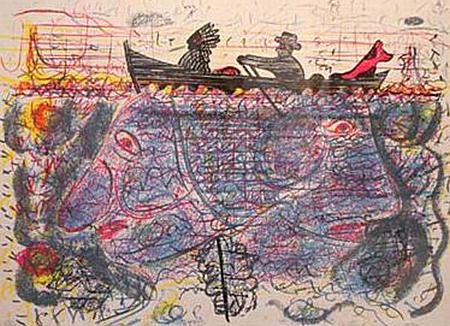
Roy De Forest

Cliffs Lake Waginaw
A.J. Casson
b. May 17, 1898
_______________________
The Fluxus Reader
Introduction: A Transformative Vision Of Fluxus
Ken Friedman
(....)We can grasp the phenomenon through the lens of several disciplines One such discipline is history, and there is a history of Fluxus to be told While the core issues in Fluxus are ideas, Fluxus ideas were first summarised and exemplified in the work of a specific group of people This group pioneered these ideas at a time when their thoughts and practices were distinct and different from many of the thoughts and practices in the world around them, distinct from the art world and different fiom the world of other disciplines in which Fluxus would come to play a role To understand the how and why of Fluxus, what it is and does, it is important to understand 'whodunit', to know what Fluxus was and did History therefore offers a useful perspective
Fluxus, however, is more than a matter of art history Liteiature, music, dance, typography, social structure, architecture, mathematics, politics they all play a role Fluxus is, indeed, the name of a way of doing things It is an active philosophy of experience that only sometimes takes the form of art It stretches across the arts and even across the areas between them Fluxus is a way of viewing society and life, a way of creating social action and life activity In this book, historians and critics offei critical and histoncal perspectives Other writers frame the central issues in other ways
The ideal book would be three times as long as this one is and impossible to publish I therefore chose to focus on issues to open a dialogue with the Fluxus idea Rather than teaching the reader everything there is to know about Fluxus, this book lays out a map, a cognitive structure filled with tools, markers and links to ideas and history both
(....)
_______________________
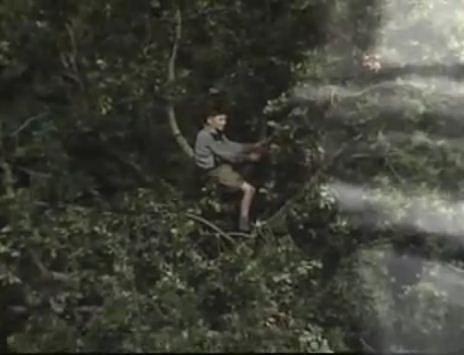
The Singing Detective
Dennis Potter
6 part BBC TV Miniseries, 1986
youtube
"The stories we read in childhood have a potency that cannot be destroyed, not even by the nostalgia which is normally the most powerful disinfectant known to man."
-
Dennis Potter in New Statesman, 10 November 1972
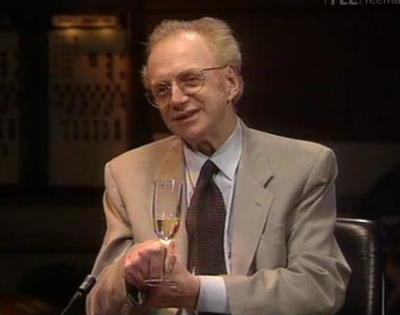
Dennis Potter
(17 May 1935 – 7 June 1994)
Dennis Potter interviewed by Melvyn Bragg
March 15 1994
youtube Clenched Fists
The Official Dennis Potter Home Page
_______________________
“Tinkling”
John Latta
How sedulously the days go. Two days of diligent, ornery rain. Smeary washes of down’d petals staining the streets madder-color’d. Coop’d up reading John Ross Macdonald’s The Drowning Pool (1950). Coddling a soft spot for the hard-boil’d. Poaching the egg cooking imagery insuccinctly out of a wise-guy unleashing of chatter-bravado here (see private detective Lew Archer stuck with a dernier cri amateur theatrics bunch in Quinto, California):
I listened to them talk. Existentialism, they said. Henry Miller and Truman Capote and Henry Moore. André Gide and Anaļs Nin and Djuna Barnes. And sex—hard-boiled, poached, coddled, shirred, and fried easy over in sweet, fresh creamery butter. Sex solo, in duet, trio, quartet; for all-male chorus; for choir and symphony; and played on the harpsichord in three-fourths time. And Albert Schweitzer and the dignity of everything that lives. ...(more)
_______________________

Goat Astride Goat
ca. 3100-2000 B.C.
Yale Digital Commons
Digital Images of Yale’s Cultural Collections Now Available for Free
The goal of the new policy is to make high quality digital images of Yale's vast cultural heritage collections in the public domain openly and freely available.
As works in these collections become digitized, the museums and libraries will make those images that are in the public domain freely accessible. In a departure from established convention, no license will be required for the transmission of the images and no limitations will be imposed on their use. The result is that scholars, artists, students, and citizens the world over will be able to use these collections for study, publication, teaching and inspiration.
_______________________
Fanny Howe’s revelation
A review of "Emergence"
Steven Toussaint
Jacket2
It is no secret that, in general, Christianity makes today’s experimental American poets nervous. Considering that genuine religious conversation in this country has been hijacked by the evangelical bloc and their teabag-toting allies on the Right whose thinly veiled homophobia, sexism, xenophobia, and militarism are accompanied by a WWJD bumper sticker, this generational rejection of the religious is unsurprising. And when we establish the philosophical foundations of a diverse American avant-garde — Marxism and subsequent theories of historical materialism, modern science, antiauthoritarianism, poststructuralism — we see not only an apparent incompatibility between religion and experimental poetry but a historical antagonism, a feud.
The avant-garde by definition exists in a perpetual state of apostasy — a denunciation or disaffiliation from the dominant thinking — and acts by way of taboo-breaking, iconoclasm, blasphemy. How can this mode possibly jibe with Christian institutions built on strict notions of hierarchy, piety, the orthodox? Can we infer that the poetic agonist, as defined within this tradition, is necessarily agnostic?
(....)
In proximity to a larger American avant-garde, whether precursors in the New American Poetry or contemporaries and peers among the Language poets, Howe’s poetics are anything but dogmatic. Emergence shows us above all else how difficult it is to be certain of anything, especially of what our most sacred terms actually mean. World, self, God, word: all are subject to the contingencies of experience which, for Howe, are themselves a wild flurry of things coming into being by way of language, and consequentially coming into meaning. From “On Time”:
A daring blue heron
Hops into place
And a cloud
Sends showers down
Some moves
Provoke endless patterns
Each thing is sewn into time, then
Having a child
Is the most extreme caprice
A smashing of space
An incarnational understanding of grace in everyday experience is articulated here both philosophically and formally. The compression of the line (reinforced by the final utterance), the simplicity of syntax, the restrained diction, the taxonomic cataloguing: all condense into the revelation, “Some moves / Provoke endless patterns.” Here, I would like to define what I perceive as “revelation” or revelatory utterance in Howe’s work as an essentially religious conception as opposed to the poetic conceit of “epiphany.”
“Epiphany” consolidates, colonizes, a sequence of experiences into a thesis statement. The language ceases to be of primary importance to the writer; it’s the imagined greater “truth” behind the curtain we’re supposed to pay attention to as well as the resounding depth of feeling. The effect is loudness — Eureka! — and its sincerity seems doubtful, its depth predetermined. The epiphany never transcends the self. Where epiphany is momentary and complete, revelation by contrast is gradual and unending: it calls attention to the processes by which the truth it speaks of is revealed. To “reveal” does not replace what was hidden with what is now visible (such a movement would be epiphanic, because static). Instead, it leads the subject to a confrontation with a greater mystery. The epiphanic poem appeals to truth, while revelation creates it. In language (i.e., not behind it) is the only possible site of revelation, and in language we behold the object of experience itself transfigured. In this passage, “Some moves” refer to those of the heron, the cloud, but also of the poet, writing about them, or better, writing them into being, and also the moves of the objects-made-words-made-revelatory. The “illuminated surface,” to quote Saint John of the Cross, is essential to Howe’s understanding of what poems do to the world, the self, the word. In Howe’s poems, the world gets worded and ignites....(more)
Fanny Howe at the Poetry Foundation and PennSound_______________________
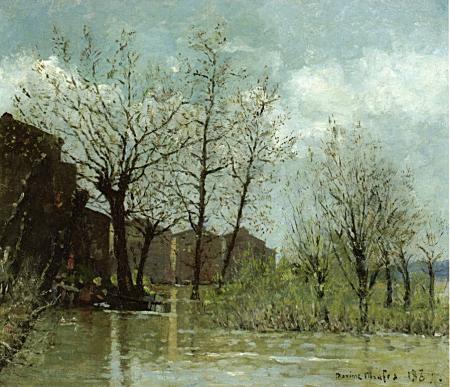
Maxime Maufra
b. May 17, 1861
_______________________
Disobedience? Really?
Jodi Dean
I cite
Disobedience seems constitutively imbricated in a relation to law and authority that is grossly hierarchical, unequal, and infantilizing. The disobedience of the child and sinner appears in the context of a supposition of a preference for obedience; obedience is the field that is disturbed and in need of restoration. In some instances, the child’s disobedience invites, perhaps unconsciously, authority’s reassertion. The same may hold for the sinner. For example, Nietzsche’s account of the role of the priests in making man an interesting animal reminds us of the benefits of giving meaning to particular acts; at least God is interested. What might have been a simple expression of strength takes on a signifying power—it means something; there is a difference between the hawk devouring the lamb and the strong devouring the weak. As sin, acts become violations that give presence to, that manifest, law in the sense of divine commands. Invoking disobedience politically, then, initially seemed to me to construe politics in terms of childish petulance, resistance, and misbehavior or, worst, in terms of the sinful acts of the fallen....(more)
_______________________

Fragment of an illustrated papyrus
1085-715 B.C.
Yale Digital Commons
_______________________
Anthropology Of This Century
Issue 1
May 2011
The Blob
Maurice Bloch
(....)
The reason for this continual repetition of old controversies is the ease with which both sides can criticise the unreality of their opponents’ understanding of people. The culturalists point to the abstraction of disembodied a priori entities such as the rational actor of game theory, or the culture and history free creatures found in much of psychology. The universalists ridicule the equally bodiless and mindless creatures found in much of cultural anthropology where people are seen as nothing other than epiphenomena of specific cultures and localities.
In this article I want to argue that the cause for the endless repetition of controversy, in the social sciences at least, comes from our failure to consider people as natural organisms rather than as the abstractions of unclear ontological status that characterise social science theory. If we focus on the evolved human animal – a very special being that is not, however, ontologically different from other living species – we can begin to understand the complex way in which we are created simultaneously by our biology, which includes our psychology, and by history and culture. And we can do so without getting lost in the smoke of battle of the phantasy wars of social science theory.
Furthermore, if we do this we can think together with the other cognitive sciences and explain to them in a more convincing way how much they need to seriously take into account the social and the cultural....(more)
_______________________

Lumberman's Cabin
A.J. Casson
 1955
Jean Fautrier
b. May 16, 1898
_______________________
Shattered Head
Adrienne Rich
A life hauls itself uphill
through hoar-mist steaming
the sun's tongue licking
leaf upon leaf into stricken liquid
When? When? cry the soothseekers
but time is a bloodshot eye
seeing its last of beauty its own
foreclosure
a bloodshot mind
finding itself unspeakable
What is the last thought?
Now I will let you know?
or, Now I know?
(porridge of skull-splinters, brain tissue
mouth and throat membrane, cranial fluid)
(....)
You can walk by such a place, the earth is
made of them
where the stretched tissue of a field or woods
is humid
with beloved matter
the soothseekers have withdrawn
you feel no ghost, only a sporic chorus
when that place utters its worn sigh
let us have peace
And the shattered head answers back
And I believed I was loved, I believed I loved
Who did this to us?
.....................................................

Adrienne Rich
(b. May 16, 1929)
photo - Robert Giard
.....................................................
Adrienne Rich on ‘Tonight No Poetry Will Serve’
paris review March 2, 2011
(....)As long as I can remember I have cared about the timbre, the phrasing of a poetic line. Ever since Snapshots, I’ve worked close to the pull and release of voices. Sometimes they’re conversational, sometimes they’re more like the dialogues or choruses of Greek tragedy, addressing conditions of urgency in a communal order or disorder. The voices may be individual, but they’re searching for a shared moral reality.
The music, the sound of words working together, has always mattered to me. But it’s not necessarily easy listening. It can be fractured, dissonant music, in the sense of Charles Mingus or Mahler’s “Das Lied von der Erde.” The poem “Reading the Iliad (As If) for the First Time” opens with the words, “Lurid, garish, gash.” I want the sense of physicality, flesh and blood, body language. I want the words to act physically on the reader or hearer.
Our ears, like it or not, take in so much in a day. Maybe some North American ears have trouble with poetry because of the noise from an aggressively voiced ruling ethos—its terminology of war, success, national security, winning and losing, ownership, merchandising, canned information, canned laughter. Poetry can be direct, it can be colloquial, it can be abrupt or angry, but it’s not that vacuous noise; it wants to unseat that kind of language, play other kinds of sound tracks.
(....) I don’t know that poetry itself has any universal or unique obligations. It’s a great ongoing human activity of making, over different times, under different circumstances. For a poet, in this time we call “ours,” in this whirlpool of disinformation and manufactured distraction? Not to fake it, not to practice a false innocence, not pull the shades down on what’s happening next door or across town. Not to settle for shallow formulas or lazy nihilism or stifling self-reference.
Nothing “obliges” us to behave as honorable human beings except each others’ possible examples of honesty and generosity and courage and lucidity, suggesting a greater social compact.
...(more)
_______________________
0h30m w/Photoshop
Paul Ford
Ftrain
It's immediately clear to me now that I'm writing again that I need to come up with some new forms in order to have fun here—so that I can get a rhythm and know what I'm doing. One thing that works for me are time limits; pencils up, pencils down. So: Fridays, write for 30 minutes; edit for 20 minutes max; and go whip up some images if necessary, like the big crappy hand below that's all meaningful and evocative because it's retro and zoomed-in. Post it, and leave it alone. Can I do that every Friday? Yes! Will I? Maybe! But I crave that simple continuity. For today, for absolutely no reason other than that it came unbidden into my brain, the subject will be Photoshop. (Do we have a process? We have a process. It is 11:39 and...)...(more)
_______________________

Shadow Self Portrait
Andre Kertesz
1927
Shooting myself
Weimar
_______________________
The Canoeing
Russell Edson
(....)
. . . Finally the quiet waters of the upstairs hall. We dip our paddles with gentle care not to injure the quiet dark, and seem to glide for days by family bedrooms under a stillness of trees . . .
...(more)
The Prose-Poem ProjectSummer 2011 via Riley Dog
_______________________
Poem with Several Unforgivable Keatsian References,
Poem Burning Up in the Fire I Lit to Warm My Son, or Do as I Say Not as I Do
Chris Dombrowski
guernica
Given the circumstances, who wouldn’t
talk to the birds—they can fly, we can’t.
I fancy starting out flirtatiously as with
this predawn phoebe: “Hello, darkling,
where’ve you been all my life?” Sure,
when we say the world we’re merely hedging
guesses but I’ll take a stab this morning,
I’ll buzz in: I recall one glorious fall hunt
when I stumbled for the scantest of moments
into a response to Blind Willie Johnson’s
earnest query “What is the soul of a man?”
before the pheasant of an answer flushed
properly into a windy horizon. ...
...(more)
_______________________

White Factory
1928
Niles Spencer
b. May 16, 1893
|

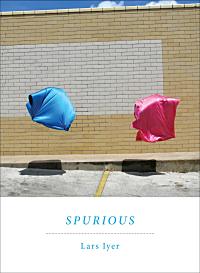


 The Age of Briggs & Stratton
The Age of Briggs & Stratton















































